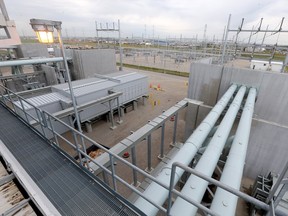Article content
There’s no getting around it. The world is consuming more energy than ever, notwithstanding a temporary slump in demand during the pandemic.
Advertisement 2
Article content
Of course, human activity requires energy. We depend on huge quantities of it to produce food, construct buildings, produce electricity, manufacture things, transport goods and people, and so on.
Canada and other relatively advanced economies owe their high standard of living to the ability to harness energy. Emerging and developing economies, where 85% of the world’s population lives, are following a similar path. As the global population climbs, so too will the demand for energy. The question is what types of energy will be produced and for what purposes, in a world where fossil fuels currently provide four-fifths of all energy.
Electricity accounts for about one-fifth of total global energy consumption. For many analysts and policymakers, decarbonizing electricity grids and pursuing the “electrification” of the wider economy are the most promising ways to tackle climate change, assuming the additional electricity comes from sources that don’t emit many greenhouse gases (GHGs). This won’t be a smooth journey, even in Canada where 80% of electricity already comes from carbon-free sources.
Article content
Advertisement 3
Article content
Electricity demand has been increasing rapidly in emerging economies, with an average 6% annual growth rate over the past three decades. The evolution of energy use in these economies will largely determine the trajectory of the global energy system going forward.
The picture is different in wealthier economies, where electricity consumption has inched ahead by 1.6% annually for the last three decades. While more electricity will be needed as richer economies strive to reduce GHGs, overall energy demand in wealthy countries has essentially flatlined, particularly — as in Japan and much of Europe — where populations are shrinking.
Electricity is the sector that has made the greatest progress in lowering GHG emissions, mainly by substituting natural gas for coal-fired power and adding renewables to the generation mix. However, as of 2023, coal still supplied 36% of global electricity, followed by natural gas (22%), hydroelectricity (14%) and nuclear power (9%). Wind and solar (the most popular pillars of renewable power) together produce just 13% of the electricity consumed worldwide.
Advertisement 4
Article content
Natural gas will play a key role in a lower-carbon future, including in the electricity sector. In Canada, many green-tinged politicians and climate campaigners stress the need to ramp up investments in renewable power. And countries around the world have devoted huge sums to that end. However, the amount of usable energy that flows from new renewable generation is often significantly less than headlines suggest. This is especially true for wind, solar and other types of “intermittent” power that must be backed up by other sources to ensure 24/7 availability.
Because economies will need to increase the quantum of electricity to move toward a lower-carbon future, they must develop vast new generation resources and spend much more on energy transmission. Natural gas will be a pivotal part of “electrifying” the energy system — globally, and here in Canada.
The future of electricity production is not an “or” but rather an “and.” Endowed with ample and remarkably diverse energy resources, Canada has an opportunity to contribute and benefit from the gifts of geology and geography, as the world navigates the complex energy transition pathway.
Jock Finlayson is a senior fellow at the Fraser Institute.
Article content



